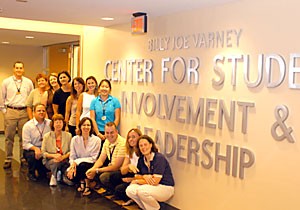UA student unions will not be making program cuts and lay-offs this upcoming year, which were originally thought necessary because of a failed student fee proposal last semester, but union officials said they are still looking for answers for their budget crisis.
The fee, had it been passed, would have added $20 to every student’s tuition in 2007 and would have continued to gradually increase to $40 by 2009. The fee would have also granted $1.4 million annually for the union to use for programming and building maintenance.
After 70 percent of student voters decided against the fee, and union officials said employment and student programming would be affected.
But instead the unions are combining student services and union jobs in order to save funds, officials said.
The Center for Student Involvement and Leadership in the Student Union Memorial Center was able to refrain from laying-off employees because of their high turnover following the end of the spring semester, said Michelle Perez, Director of CSIL.
This allowed union officials to combine certain union positions and programs, Perez said.
For instance, the union did not hire a programming director for Park Student Union for the fall, because the planning for PSU programs will be combined with SUMC programming, Perez said.
“”We are using the staff we have to be more efficient so we don’t spread ourselves too thin,”” Perez said.
The CSIL will replace some student employee positions with an office supervisor and may offer unpaid internships to students, rather than employment.
“”The biggest change is with staffing, to reduce labor costs,”” Perez said.
In the fall, the CSIL will also begin charging a $20 processing and registration fee to student clubs, to provide funding for the CSIL to maintain accurate club listings, Perez said.
David Reece, executive vice president of the Associated Students of the University Arizona, said he is afraid this fee will create funding problems for student clubs and organizations and could decrease the amount of organizations from the current estimate of 500 to as low as 300.
“”The $20 recognition fee is an unfortunate roadblock on the path to club recognition and development. The detriment it creates for clubs is not justified by the mere $6,000 to $12,000 it will generate for CSIL. In this sense, the fee is counterproductive and could stifle the efforts of hundreds of clubs,”” Reece wrote in a statement prepared for the Arizona Summer Wildcat.
Reece said he is trying to work with CSIL to negotiate ways around the fee for organizations.
To generate more funding the union has implemented a 5 percent raise in prices across the union and reduced the hours of operation for some union services this summer, which were two of the changes originally thought necessary after the fee was voted down by students, said Nicolas Adamakis, marketing specialist for the student unions.
For example, the Gallagher Theater, and the game room and Cellar restaurant in Wilbur’s Underground, which were open as late as 4 a.m. on weekends, will now be closed at midnight, Perez said.
Some students wondered why the fee was proposed, since program and employment cuts will not be made.
“”It looks like (the student) union is doing a pretty good job of managing without the fee. That leads me to wonder if the fee was necessary,”” said Brad Burns, chief of staff for Reece.
Although program and labor cuts are not being made this year, that doesn’t mean they will not occur in the future as more funding is needed, Adamakis said.
“”There is only so much fat to shave off the bone. Right now we are scraping the bone,”” Adamakis said.
The union is still looking for other ways to bring in needed additional revenue for necessary building repairs, like replacing PSU’s roof, and maintaining current student
programs and services.
Other possibilities for bringing in more revenue are user fees for services like the computer labs and another student fee proposal, but nothing has been decided, Adamakis said.
Burns said the revenue the union needs should come from a more hands-on approach, such as user fees or higher prices, because then only the students who really use the union will be the ones giving back the revenue to support it.
“”That wouldn’t be cool if there was a fee to use the computers, but I would still use them, because they are really convenient,”” said Elizabeth Ramnath, a psychology senior.
Adamakis said he would like to be able to offer events like concerts to students if the union has the proper funding in the future, but for now the union is just trying to maintain the services they already provide.
“”Right now, we can’t be as proactive with services as before, because the money just isn’t there,”” said Adamakis.
“”The fact that the union fee was not passed doesn’t mean the problem went away,”” Adamakis said. “”Students need to realize costs are always rising to maintain the way the union is right now. Maintaining lounges cost money.””
Adamakis said he is hopeful for future discussions of the student fee because new UA President Robert Shelton will eventually have to pay attention to the union’s plight, which could possibly result in mandatory meal plans.
“”We need to find out what students want from their union, if they want to keep having the best union in the country,”” Adamakis said.
Burns doesn’t think it would be unlikely if students voted to pass a fee with different parameters in the future.
“”Student opinion will change because students are reasonable, and if they see a clear progression between the fee and the benefits, they will accept the cost,”” Burns said.









